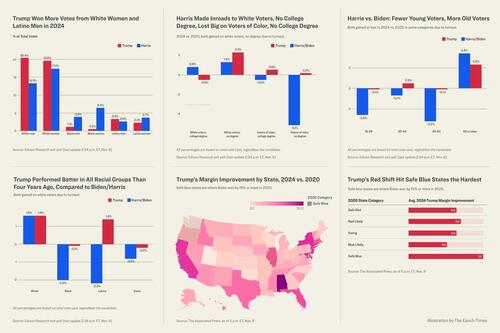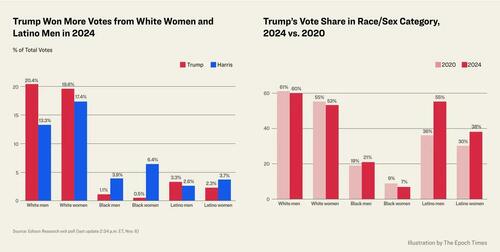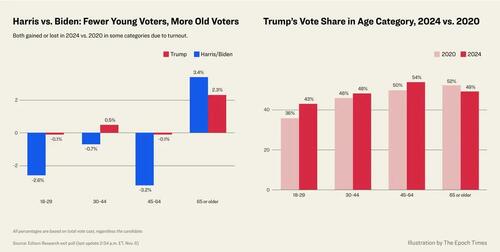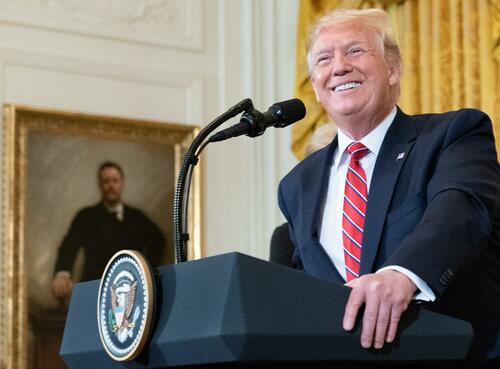Authored by Brandon Smith
For the past several months I’ve been discussing the high probability of Donald Trump’s return to the White House. Specifically, I have warned that the Biden/Harris Administration along with the Democrats have been using data manipulation to hide the growing threat of a stagflationary collapse within the U.S. within the next couple of years.

In my article Smoke and Mirrors: What Happens After Biden’s Economic Manipulations Disappear? published in September, I outlined the specific tricks Biden’s team has been using to obscure the decline in the labor market, hide the true inflation problem, marginalize the exploding national debt issue and manipulate the CPI while artificially propping up GDP with government spending. In that article I noted:
If someone was to ask me what I predict, I would have to say Trump will be president again. From all the evidence I’ve seen the Harris campaign is an astroturf movement with a limited voter base. She’s obviously not very bright and I don’t think the theatrical “joy” strategy is convincing very many people of her competency. Her economic policies (including price controls) are full bore communist and would be devastating to any form of U.S. recovery. Her fiscal plan will be even worse than Bidenomics has been…
I suspect that if Trump enters office once again there will be a multitude of changes to our economic data and they will happen quickly. Some of the rigging is already being exposed, just not on a level where the majority of the populace is aware of it…
Now that the election outcome has been decided and Trump is the clear winner by a landslide in the electoral college and the popular vote, we should keep in mind that the real fight for the future of America starts in 2025. We should also consider the fact that the fate of the conservative ideal (and perhaps the ideals of all western civilization) are now inexorably tied to the success or failure of the Trump Administration.
Meaning, when Trump enter office again the establishment will seek to blame every negative event not just on Trump, but on ALL conservative and liberty minded principles. This is a problem because Trump is about to inherit perhaps the worst economic time bomb in American history.
I call it a Catch-22 trap and I predicted this dangerous outcome back in 2021. Here’s how it works:
Because of dollar overprinting and government overspending the U.S. is now in a stagflationary death spiral. It took decades to produce this financial singularity, but it is finally upon U.S. and it will be very difficult to reverse.
When the government and the Federal Reserve were finally forced to acknowledge the stagflation crisis in 2022, the Fed had to be seen as at least trying to stop the bleeding. So, they launched interest rate hikes. The problem is, the U.S. is also suffering from exponential national debt and each rate hike greatly increases the amount of interest the nation has to pay per year. For now, the U.S. pays around $1 trillion in gross interest every three months. This means our national debt will skyrocket while rates are high.
But the Fed has entered a process of rate cuts, you say? Inflation is defeated, you say?
The whole calamity has been conveniently solved by Joe Biden and friends right before Trump takes over, you say?
No.
Inflation is still a problem (concealed by statistics)
The problem is that the inflation threat has not been solved, it has been hidden. CPI is not a measure of cumulative inflation, it is a measure of monthly inflation diluted by tens of thousands of goods and services, most of them not necessities. For the past couple years Biden has been dumping U.S. strategic oil reserves on the market in order to bring energy prices down and artificially reduce CPI, but this has not lowered cumulative inflation.
As the Fed cuts rates through 2025, the inflation panic will return.
And if the Fed keeps rates high to counter inflation, the national debt climbs to disastrous levels.
If they cut rates, then inflation returns and price increases will continue to spiral.
Damned if we do and damned if we don’t, and guess who gets the blame? That’s right, Trump and his cabinet.
And for those who argue that Americans won’t blame Trump because they’ll know that the decline was caused by Biden, I would note that public patience shrinks as quickly as their bank accounts. They will blame whoever is in power now, when the bomb goes off, regardless of who lit the fuse.
The Democrats already tried to blame Trump for the majority of the stagflation crisis and the covid crisis (even though it was Democrat states that attempted to keep lockdowns in place permanently). You know they’ll keep the propaganda pumping constantly for the next four years.
But what can the Trump Administration do to defuse the situation? I could write an entire book on this but here are the first few actions I would take if I were in his shoes:
#1 – Expose Biden’s data manipulation
The first thing Trump needs to do is set up an economic advisory board (Ron Paul would be a great candidate to lead such a project) and one of their primary tasks should be to expose how the Biden Admin has been hiding the real economic data from the nation at large.
The temptation will be to keep this data under wraps for fear that it will destroy the country should everyone know the facts. I think the country has voted in great numbers for an end to the status quo and that they want transparency. We can handle the truth.
If Trump doesn’t educate the public on how the Democrats and the establishment have been rigging the numbers, then the public will ultimately blame conservatives for any eventual crash. Also, when the public knows the truth, they will also understand why dramatic changes to policy need to be made.
#2 – Offset tariffs with incentives for domestic industry and manufacturing
A major pillar of Trump’s economic plan includes tariffs on foreign goods as a way to pay off the national debt, reduce taxes and fund the government. Leftists claim tariffs are actually a “tax on the American consumer” and will end in disaster as prices rise. They’re ignoring the fundamental point.
Tariffs cause an increase in prices on foreign-made goods, not American made products. We simply need to manufacture more in the U.S. Why does the U.S. need to remain stuck as a consumer country only? Why can’t we also produce?
First, tariffs are not just a tax, they are leverage. Europe is already talking about buying more commodities and goods from the U.S. so they can avoid high tariffs. China is likely to do the same. The U.S. is the biggest consumer market in the world with 30% of global share. No other nation comes close. Producer nations would face economic disaster without access to U.S. customers.
That said, it’s not enough. There needs to be a backstop of domestic production and I think this could also help reduce price increases. How? If the U.S. focuses on what I call the “quality economy” then prices will be higher for a time, but in the long run inflation will drop significantly. The key is that we produce goods with a high quality standard – products that last for many years and have a significant warranty attached.
If our goods are better than foreign products and they last longer, then people will buy less stuff over time. This means reduced spending, more savings, lower demand and ultimately lower prices.
There’s a number of ways Trump could subsidize this domestic manufacturing boom while also greatly increasing American wages and the standard of living. Biden pretended he was going to do this with his so-called Inflation Reduction Act and his green energy programs.
Trump could do it for real.
#3 – Issue government debt backed by gold or silver (and precious metals savings accounts)
Currently, the U.S. is facing rising costs on debt with declining foreign interest in “investing” in federal IOUs. In order to stop the death plunge of national debt and the explosion of debt service payments, radical measures need to be taken.
The inflation and debt issues are not going to solve themselves. The Federal Reserve does not have the tools to fix the situation even if they wanted to. However, Trump does have the power to issue special debt backed by the gold and silver reserves of the U.S. government. This allows him to bypass the Fed.
A maturity of around 5 years or more would be ideal to fund his short-term initiatives. He could set the payoff at maturity according to the true market price of gold and silver. (First, a federal investigation into gold and silver price manipulation by major banks would need to be pursued concluded.) At maturity, they’d be redeemable in dollars or physical gold or silver. That’s always been the #1 method of instilling trust in assets.
A similar idea would be to create a savings account backed by U.S. gold and silver reserves. Make a term deposit of currency and, upon maturity, the account can be exchanged for physical gold and silver metals or dollars. Or a debit card, or even cryptocurrency could be issued for those savings.
I believe this could solve the national debt issue by reviving foreign enthusiasm for federal government debt. Furthermore, this would alleviate the inflation problem by offering all Americans easy access to inflation-resistant gold and silver to protect their savings from inflation (and making a little extra money on the side). The more people who participate, the higher the value of metals will go.
Americans can and should buy physical precious metals, but let’s be honest, gold coins and silver bars don’t spend easily in everyday transactions. We need an intermediary system that offers people liquidity. Shifting directly back to a gold standard would cause significant chaos in U.S. and global financial systems.
Let’s face it – we can’t go cold turkey on the Federal Reserve note. We need to wean the nation off unbacked, intrinsically-worthless currency. Opening up access to our nation’s gold reserves is a starting point.
I’m also sure there’s plenty of Keynesians out there that will claim that giving citizens access to gold and silver is impossible and it will destroy the economy. I tell you it’s Keynesian thinking that got us here in the first place.
What I’m proposing here is a middle ground option that could lead to a commodity backed currency system in the future. We must deal with our immediate debt crisis and inflation crisis, but it’s not impossible.
#4 – A moratorium on debt ceiling increases
The gold and silver savings account program and tariffs would allow the federal government to continue funding itself while also cutting taxes and putting a stop to deficit spending by cutting out waste.
Every time there’s a debate over the debt ceiling and conservatives call for a stop to the madness, Democrats (and neocons) accuse them of putting the country in peril. They hold the country hostage with tales of collapse until fiscal conservatives inevitably give in and the debt continues to rise.
No more.
We cannot keep consuming debt poison and expect our national health to improve.
When Elon Musk took on the ownership of Twitter he fired over 80% of the existing workforce. Leftists said the website would implode within months. They were wrong (again) and the site now functions better than ever despite far higher user traffic. The federal government is a lot like the old Twitter – It’s a bloated and obese bureaucracy loaded with self-serving dead weight that needs to be torched before it causes a systemic heart attack.
This is the only way things will get better, not just for us, but for our children and their children.










